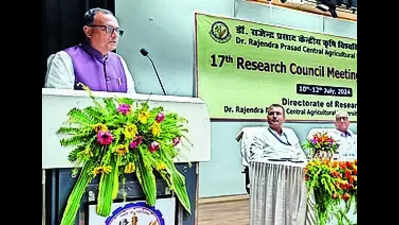11 New Crop Varieties Developed at RPCAU in 18 Months, Says VC | Patna News – Times of India


Patna: Rajendra Prasad Central Agricultural University (RPCAU) meets more than 80% requirement of Bihar’s seeds, which the state govt sells to the farmers, said RPCAU’s vice-chancellor, P S Pandey, on Wednesday.
Inaugurating the three-day 17th annual meeting of the university’s research council at Pusa (Samastipur), the VC said, scientists are making sincere efforts to meet the various agricultural requirements of farmers through their innovative researches.He pointed out that as many as 11 new varieties of crops and 22 new technologies have been developed by the university’s scientists in the past 18 months.
He said with the help of local farmers, the university has adopted a number of villages in the region and developing them as ‘model villages’. Kothiya village, located adjacent to RPCAU campus in Samstipur district, has been developed as a ‘solar village’ by ensuring optimum utilisation of solar power.
Emphasising the need of promoting inter-disciplinary research on the campus, Pandey said scientists should focus on researches aimed at climate-resilient crop production.
Agricultural experts, including Navasari Agricultural University’s former vice-chancellor A K Pathak, Dharwad Agricultural University’s former VC M B Chetti and Dev Sanskriti University’s former vice-chancellor, S D Sharma, are attending the meeting to review the progress of over 200 ongoing researches in the RPCAU.
We also published the following articles recently
Learn about the groundbreaking development in AI from China – a robot powered by a lab-grown, artificial brain controlled by human stem cells. This innovative brain-on-chip technology enables the robot to perform tasks with the potential to advance brain-computer interfaces.
Read about Scandron Pvt Ltd’s latest achievement in receiving DGCA certification for its agricultural drone model. The drone is tailored for spraying fertilizers and monitoring crops, supporting the ‘Make in India’ initiative for local manufacturing.
Learn about the latest research uncovering rare helper T cell subtypes connected to immune conditions like asthma and multiple sclerosis. The innovative ReapTEC technique identified genetic enhancers in these T cell types, offering potential for novel treatments for immune-related diseases.















